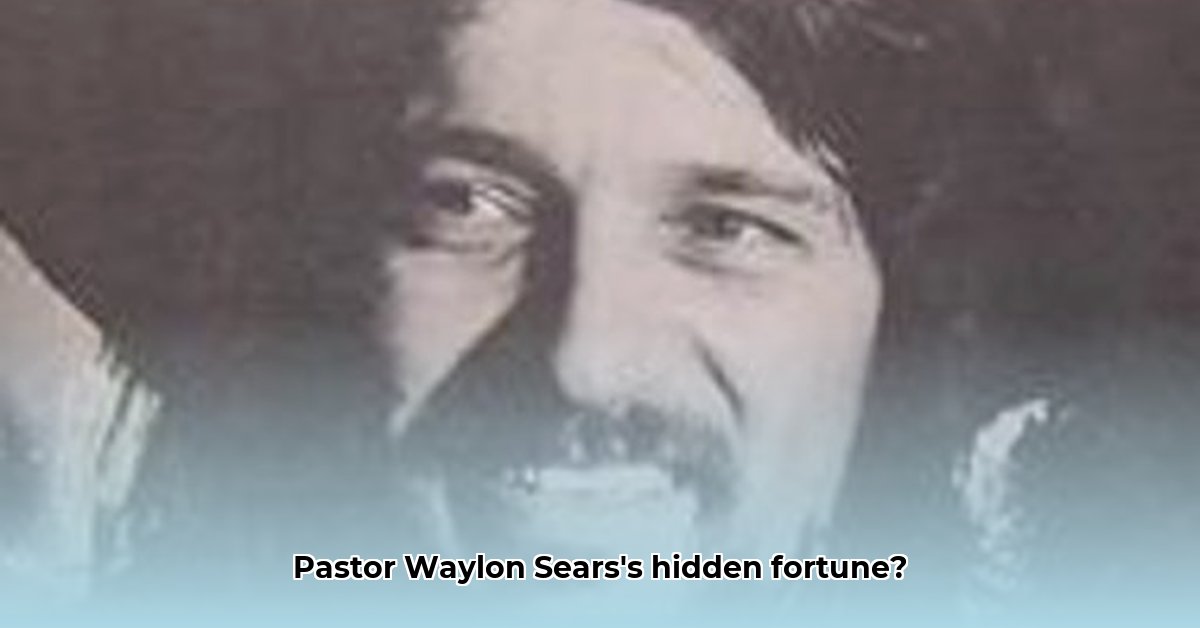
Unraveling the Enigma of Pastor Waylon Sears's Finances
Determining the net worth of Pastor Waylon Sears presents a significant challenge. While public curiosity surrounding the wealth of prominent religious figures is understandable, obtaining reliable financial data in such cases is surprisingly difficult. This article explores the complexities involved, acknowledging the limitations of available information while analyzing the broader issues surrounding transparency in religious finances. For further examples of similar investigations, see pastor net worth examples.
The Challenges of Assessing Religious Leaders' Wealth
Several factors contribute to the difficulty in assessing Pastor Sears's net worth. Firstly, many churches don't publicly disclose their leaders' compensation packages. This lack of transparency makes accurate estimations extremely challenging. Additionally, pastors often have diverse income streams beyond their church salary, including book sales, speaking engagements, and potentially private investments. Tracking these multiple income sources demands extensive and often inaccessible information.
A significant hurdle is the prevalence of unsubstantiated claims online. Numerous websites publish lists purporting to reveal the wealth of prominent pastors, but these figures often lack supporting evidence, varying wildly across different sources. The absence of verifiable methodology casts serious doubt on their accuracy. Such reports highlight the need for critical evaluation of online sources and reinforce the inherent difficulties in verifying financial information related to religious leaders.
Ethical Considerations and Public Perception
The discussion of a religious leader's wealth inevitably raises ethical questions. What constitutes appropriate compensation for a spiritual leader? How do we balance an individual's right to financial privacy with the public's interest in transparency, especially when significant resources are involved? A pastor's accumulation of significant wealth can raise concerns about priorities and resource management, potentially creating a dissonance between preached values and personal lifestyle. This delicate balance often fuels public scrutiny and internal community tensions.
The Current State of Knowledge Regarding Pastor Waylon Sears's Finances
Based on publicly available information, a precise determination of Pastor Waylon Sears' net worth is currently impossible. Any figures circulating online should be considered speculative until substantiated by verifiable evidence. Greater transparency from Pastor Sears or his affiliated organization is necessary to provide a clearer picture of his financial standing. Until then, we must acknowledge the limitations of the available data.
Addressing the Need for Transparency in Religious Finances
The lack of readily available financial data surrounding religious leaders is a significant issue requiring attention. Increased transparency from religious institutions, coupled with more robust methods for verifying financial claims, is essential. This would foster more informed public discourse and reduce the prevalence of unsubstantiated claims. By embracing greater openness, we can engage in more productive discussions related to the financial aspects of religious leadership. Future research and improved data accessibility may shed further light on Pastor Sears's financial situation, but currently, the available evidence prevents a definitive assessment.
Strategies for Verifying Net Worth Claims of Religious Leaders
The challenges in determining Pastor Waylon Sears's net worth highlight the broader issue of verifying the net worth of wealthy American pastors. This requires a multifaceted approach.
Key Takeaways:
- Publicly available financial data on religious leaders is frequently limited.
- Diverse income streams make accurate calculations challenging.
- Tax regulations and the non-profit structure of many religious organizations add layers of complexity.
- Scrutiny requires investigative techniques and careful interpretation of existing, often incomplete, data.
Investigative Approaches:
Public Records: Examining available property records, IRS filings (if accessible), and public financial statements offers starting points, though often incomplete.
Financial Reporting (if available): Some larger organizations may voluntarily release annual reports; however, thorough analysis is crucial to confirm their completeness and accuracy.
Lifestyle Indicators (with caution): Analyzing visible aspects of a pastor's lifestyle, while offering indirect clues to wealth, should be interpreted cautiously and only used in conjunction with other data points.
Media Scrutiny: A review of media coverage may reveal prior reporting on the pastor's finances, but always cross-reference multiple sources to account for potential biases.
Ethical considerations: Approaching this investigation requires sensitivity to issues of privacy and religious freedom, while simultaneously striving for responsible reporting and public accountability. The complexities of the case emphasize the need for a nuanced and ethical investigative approach.
The ultimate goal is responsible reporting that balances public interest in transparency with respect for individual privacy. While a definitive answer may remain elusive in Pastor Waylon Sears' case, adopting these investigative strategies can facilitate a more informed and accurate understanding of the financial affairs of religious leaders.